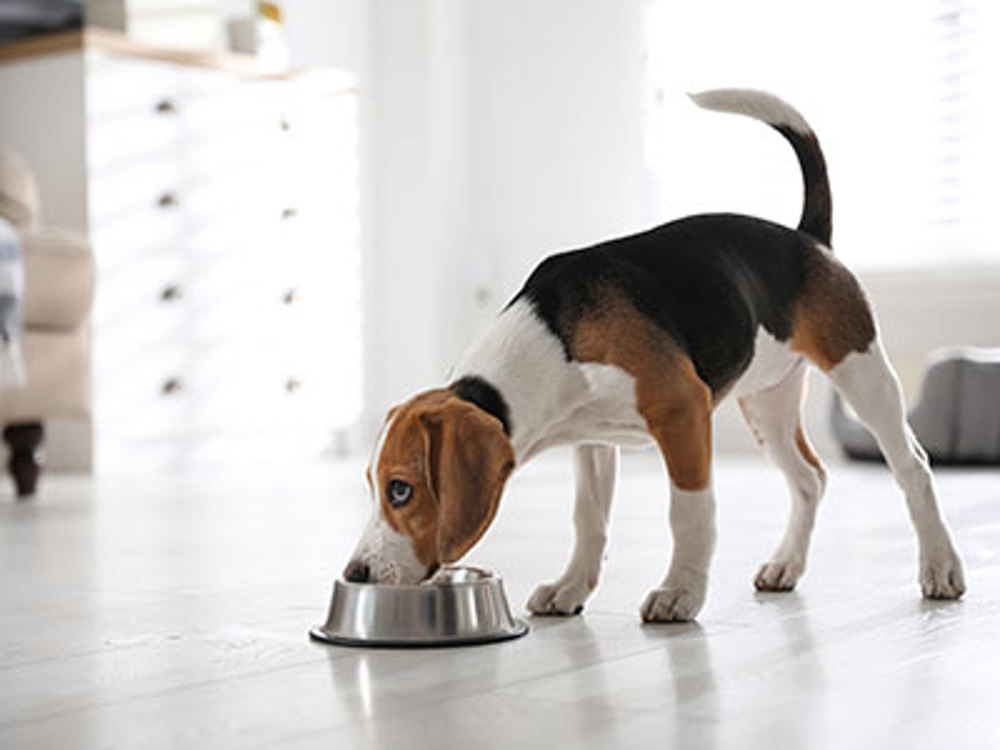
If your dog reacts to certain foods, it’s possible that they might have a food allergy or an intolerance, but how can you help treat them, what symptoms should you watch out for and when should you visit your vet?
Can dogs have food allergies?
Yes. Just like us, our dogs can develop a food allergy or food intolerance at any time of their life, even after years of eating the same food! Food allergies account for around 10 per cent of allergies in dogs.
What is a food allergy?
If your dog has a food allergy their immune system mistakenly sees a certain part of the food as a threat to the body. When the body is under attack from things like viruses or bacteria, antibodies are released to help identify the danger and neutralise it. When your dog develops a food allergy, its body reacts in a similar way to food allergens and the resulting immune response can impact the whole body.
What is an intolerance?
An intolerance is different from an allergy in that it does not involve the immune system. The cause of an intolerance is not always known, but is usually linked to problems digesting the food, rather than an issue with the immune system. Clinical signs, caused by an intolerance, usually causes local issues around the stomach and gut, causing wind, stomach pain or bloating, although they can also have impacts on the whole body too.
What foods commonly cause an allergy or intolerance?
Any food ingredient could cause an allergic reaction or an intolerance. Food allergies, however, are almost always caused by a protein source – most commonly chicken, beef or dairy.
Symptoms of a food allergy
Signs of a food allergy or intolerance can include:
- Being sick
- An upset stomach
- Excessive wind
- Losing weight
- Itchy skin that can become red and irritated
- Regularly getting skin or ear infections
- Licking themselves a lot
Did you know that dogs don’t have ‘symptoms’?
Technically, the definition of a symptom is a clinical effect that’s been described by the patient. Since dogs can’t describe how they're feeling they actually have ‘clinical effects’ rather than ‘symptoms’. In some of our articles we use ‘symptoms’ because it’s a well understood term and is commonly used by dog owners. It may not be the correct use of the word, but we aim to produce information that’s accessible to all and can be easily found by owners.Can a dog suddenly develop a food allergy?
Yes. Food intolerances can appear at any time in a dog’s life, even if they’ve frequently eaten that food before. Food allergies often begin between one and three years old, but this isn’t always the case.
Which breeds are most affected?
Any dog can develop allergies, but some breeds may be more likely to develop them than others. Breeds most commonly affected include:
How are food allergies diagnosed?
If you think your dog might have a food allergy or an intolerance, then you should always speak to your vet before changing your dog’s diet. Your vet may suggest putting your dog on a food elimination trial, which helps rule out other causes of their illness. This involves only feeding your dog a specially formulated diet, usually something called a ‘fully hydrolysed diet,’ where all proteins in the food have been broken down to a level that is so small the body no longer recognises it and it is therefore very unlikely to cause a reaction. Your dog must only eat this food and nothing else for a minimum for 4-6 weeks. If they eat any other foods, including treats, human foods, or even dental sticks, then it might make it difficult for your vet to work out what the problem is. Your vet will recommend a suitable diet to feed your dog and may be able to advise how to make treats out of this special food.
What can I feed my dog?
Once your vet has confirmed that your dog has a food allergy or intolerance, they will be able to recommend an appropriate diet for your dog. It’s important to talk through your diet options with your vet and choose a diet that helps keep your dog healthy and nourished.
When should I contact my vet?
If you think your dog may have an allergy or a food intolerance, then it’s important that you contact your vet for advice. There are several other health problems that could cause similar effects, so it’s important that you speak to your vet to determine what is wrong with your dog.
Article author
Content provided by PRO PLAN, The Kennel Club’s partner in dog nutrition.
Think your dog may be affected?
If you're worried about your dog's health, always contact your vet immediately!
We are not a veterinary organisation and so we can't give veterinary advice, but if you're worried about any of the issues raised in this article, please contact your local vet practice for further information
Find a vet near you
If you're looking for a vet practice near you, why not visit the Royal College of Veterinary Surgeons' Find a vet page.
